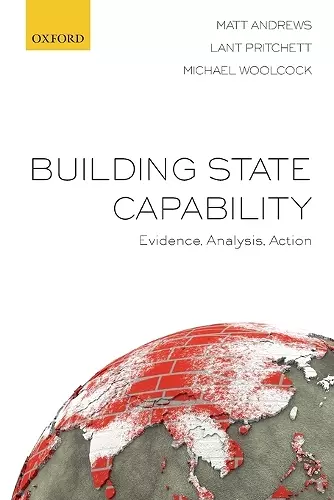Building State Capability
Evidence, Analysis, Action
Michael Woolcock author Matt Andrews author Lant Pritchett author
Format:Paperback
Publisher:Oxford University Press
Published:5th Dec '19
Should be back in stock very soon
This paperback is available in another edition too:
- Hardback£75.00(9780198747482)

Governments play a major role in the development process, and constantly introduce reforms and policies to achieve developmental objectives. Many of these interventions have limited impact, however; schools get built but children don't learn, IT systems are introduced but not used, plans are written but not implemented. These achievement deficiencies reveal gaps in capabilities, and weaknesses in the process of building state capability. This book addresses these weaknesses and gaps. It starts by providing evidence of the capability shortfalls that currently exist in many countries, showing that many governments lack basic capacities even after decades of reforms and capacity building efforts. The book then analyses this evidence, identifying capability traps that hold many governments back - particularly related to isomorphic mimicry (where governments copy best practice solutions from other countries that make them look more capable even if they are not more capable) and premature load bearing (where governments adopt new mechanisms that they cannot actually make work, given weak extant capacities). The book then describes a process that governments can use to escape these capability traps. Called PDIA (problem driven iterative adaptation), this process empowers people working in governments to find and fit solutions to the problems they face. The discussion about this process is structured in a practical manner so that readers can actually apply tools and ideas to the capability challenges they face in their own contexts. These applications will help readers devise policies and reforms that have more impact than those of the past.
Building State Capability provides anyone interested in promoting development with practical advice on how to proceed--not by copying imported theoretical models, but through an iterative learning process that takes into account the messy reality of the society in question. The authors draw on their collective years of real-world experience as well as abundant data and get to what is truly the essence of the development problem. * Francis Fukuyama, Stanford University; author of State-Building: Governance and World Order in the 21st Century *
The course was terrific from both a theoretical and practical standpoint. I was amazed about how accurately the issues addressed in the course related to my day-to-day experiences working in development. In fact, I have incorporated many of the ideas taught in this course in my own development work! * David Levy, Team Leader, Asian Development Bank, Dili, Timor-Leste, (Course Participants Using Building State Capability) *
The PDIA course has been for me the learning highlight of this year. The course has given me the knowledge of a process and tools that I was looking since traditional approaches to projects with best practices from elsewhere, solution-based, blueprint-based, with fixed plan, aiming always at system change, etc. do not work in most cases. I have now a set of steps and, more importantly, questions that can guide me in the work with colleagues and partners to understand the context in which we try to introduce change, identify concrete problems that people want to solve, and try to solve them, one at a time. * Arnaldo Pellini, Research Fellow, Overseas Development Institute (Course Participants Using Building State Capability) *
As a Project Manager and Solutions Consultant in Nigeria, taking [the PDIA course] opened paths to new possibilities for finding and fitting solutions that are based on specific contexts and current realities, by working with clients, communities and policy drivers. At the heart of these possibilities is the realization that no matter what the problem is or how complex it seems, we can start acting immediately. Most importantly, the interactions with peers and access to a growing PDIA Community of Practice provide unlimited potential for the future. * Abubakar Abdullahi, Managing Principal, The Front Office NG, Nigeria (Course Participants Using Building State Capability) *
ISBN: 9780198853039
Dimensions: 235mm x 161mm x 15mm
Weight: 426g
280 pages